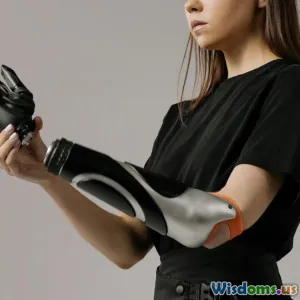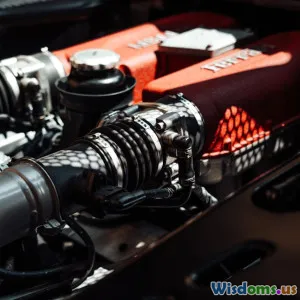
Is Your Car Spying on You Examining Privacy Concerns in Connected Cars
10 min read Explore privacy risks in connected cars and learn how your vehicle might be tracking your every move without consent. (0 Reviews)
Is Your Car Spying on You? Examining Privacy Concerns in Connected Cars
The automotive world has transformed at breakneck speed over the past decade. Gone are the days when a car was simply a machine to get from point A to B. Today’s vehicles are sophisticated computers on wheels—brimming with sensors, cameras, GPS modules, infotainment systems, and myriad connectivity features. These “connected cars” promise greater convenience, safety, and entertainment but they also introduce a less visible risk: the erosion of personal privacy.
Introduction
Imagine cruising down the highway, enjoying your favorite playlist. Meanwhile, your car might be silently logging your every movement, your conversations, and even sharing this information with third-party companies or government entities. Is this a spy movie plot? Sadly, no—it’s the reality for millions of drivers worldwide. But how much do we truly know about what our cars are recording and who has access to this information? This article ventures into the world of connected cars' privacy challenges and what drivers can do to reclaim control over their data.
The Rise of Connected Cars: A Double-Edged Sword
Connected cars integrate multiple technologies—cellular connectivity, Wi-Fi, Bluetooth, and vehicle-to-everything (V2X) communications—that allow them to communicate with each other and with external networks. Features like real-time navigation, automatic emergency calls, remote diagnostics, and personalized singing through AI assistants redefine the driving experience.
However, every connection facilitates data collection:
- Location data: GPS systems continuously track where you drive.
- Biometric data: Voice commands and cameras capture user interactions.
- Behavioral data: Driving habits, speed, braking patterns, and seatbelt usage.
- Multimedia data: Phone contacts, messages synced to infotainment.
For instance, General Motors’ OnStar system and Tesla’s over-the-air updates require continuous data streams. According to a Gartner report, by 2025, over 75% of new vehicles sold worldwide will be connected. This interconnectedness offers immense utility but also injects unprecedented risks to driver privacy.
What Data Are Connected Cars Collecting?
Location and Movement
Connected cars routinely use GPS to provide navigation and traffic updates. But these logs essentially create a detailed map of your daily routines—where you shop, work, worship, or socialize. Insurance company usage-based insurance (UBI) programs actively use GPS and driving data to calculate premiums, rewarding safe drivers but also sharing driving history that could affect your rates in other ways.
In-Car Conversations and Audio Data
Many vehicles now incorporate voice assistant technology like Amazon Alexa, Google Assistant, or proprietary AI—designed to respond hands-free. These systems activate upon hearing “wake words,” but concerns persist over continuous or accidental recording. A 2020 investigation found incidents where car voice assistants inadvertently recorded private conversations and sent them to random contacts.
Video Data: Cameras Inside and Outside
Dashcams are popular, but factory-installed cameras pose deeper privacy questions. Tesla’s in-cabin camera, dusted with purpose for driver attention monitoring, sparked backlash from privacy advocates fearing unauthorized image capture. According to Wired, some vehicles collect video data that can be uploaded to manufacturers’ servers, where it might be repurposed beyond safety.
Personal Devices Integration
Smartphones and cars often integrate via Apple CarPlay or Android Auto. This link syncs calls, messages, calendars, and sometimes app data to the vehicle. This deep integration opens another potential data leak point—data not strictly about the vehicle but about the driver’s entire digital life.
Who Has Access to Your Data?
The ecosystem underlying connected vehicles is complex, including:
- Automakers: Who design systems, collect data for performance and marketing.
- Third-Party Vendors: Providers of navigation, infotainment, or telematics services.
- Insurance Companies: For telematics-based assessments.
- Law Enforcement Agencies: In some jurisdictions requests data through subpoenas.
- Hackers and Cybercriminals: Exploiting vulnerabilities to access data maliciously.
Studies reveal widespread sharing among these parties often without explicit user awareness. For example, Ford’s privacy policy states user data may be shared with affiliates or contractors, raising transparency questions.
Real-World Incidents Highlighting the Risks
- Inadvertent Recording: In 2019, a reporter for a major publication experienced their private conversation picked up and transmitted unexpectedly by a vehicle’s voice system.
- Unauthorized Tracking: A class-action lawsuit was filed against Toyota in 2021 when it emerged that their telematics data sharing was criticized as intrusive and inadequately disclosed.
- Hacking Threats: Researchers have demonstrated how connected cars can be remotely hacked to access data or even interfere with vehicle controls, underscoring security gaps that pose privacy risks.
Regulations and Privacy Protections
Regulatory frameworks lag behind technology. The U.S. has no comprehensive federal law governing connected car data, relying instead on patchwork state laws like the California Consumer Privacy Act (CCPA). The European Union’s General Data Protection Regulation (GDPR) offers stronger data protection, explicitly regulating personal data processing by vehicle manufacturers and related companies.
Industry groups like the Alliance for Automotive Innovation advocate for transparent data consent processes and stringent cybersecurity standards, but adoption is inconsistent.
What Can Drivers Do to Protect Their Privacy?
Understand Your Vehicle’s Data Policies
Read the privacy statements accompanying your car’s infotainment and telematics services. Look for disclosures about what data is collected, shared, and stored.
Manage Connectivity Settings
Disable unnecessary features such as always-on voice assistants if possible. Limit Bluetooth and smartphone synchronization to minimum required functions.
Update Software Regularly
Automaker software updates often patch security flaws. Staying current reduces risk of hacking.
Use Encryption and Strong Authentication
If available, set strong PINs or biometric locks to restrain unauthorized access to vehicle systems.
Consider Privacy-Focused Equipment
For aftermarket choices like dashcams or infotainment, select reputable products known for clear data policies.
Advocate for Stronger Laws
Support policies that require automakers to implement clear opt-in consent for data collection and share strict guidelines on data use.
The Road Ahead: Balancing Innovation and Privacy
The automotive industry’s embrace of connectivity signals exciting possibilities—autonomous driving, enhanced safety, intelligent transport systems—but must be balanced by responsible privacy practices. Manufacturers, lawmakers, and consumers must collaborate to ensure transparency, data minimization, and user control baked into vehicle technologies.
Tech historian Shoshana Zuboff warned of “surveillance capitalism” driven by everyday devices collecting behavioral data for profit. Connected cars fall squarely in this paradigm, demanding vigilance.
Conclusion
Your car is more than a ride; it’s a data hub constantly gathering insights about you. While connected cars revolutionize how we drive and interact on the road, they also pose real, tangible privacy risks. Being informed about these risks empowers you to make smart choices—protecting your information without rejecting innovation outright. Ultimately, the future of driving will depend not just on technological advances, but on prioritizing the privacy and trust of every driver behind the wheel.
Takeaway: Treat your vehicle as carefully as you do your smartphone—understand what data it collects, who has access, and take active steps to safeguard your privacy on the connected road.
References
- Gartner, "Market Challenges in Connected Vehicle Data Protection," 2022.
- Wired Magazine, "Inside Tesla’s Surprising Approach to Driver Privacy," 2021.
- California Consumer Privacy Act (CCPA), official documentation.
- Zuboff, Shoshana, "The Age of Surveillance Capitalism," 2019.
- Forbes, "The Hidden Dangers of Connected Cars," 2020.
Written by an industry expert passionate about automotive technology and data privacy.
Rate the Post
User Reviews
Popular Posts




















